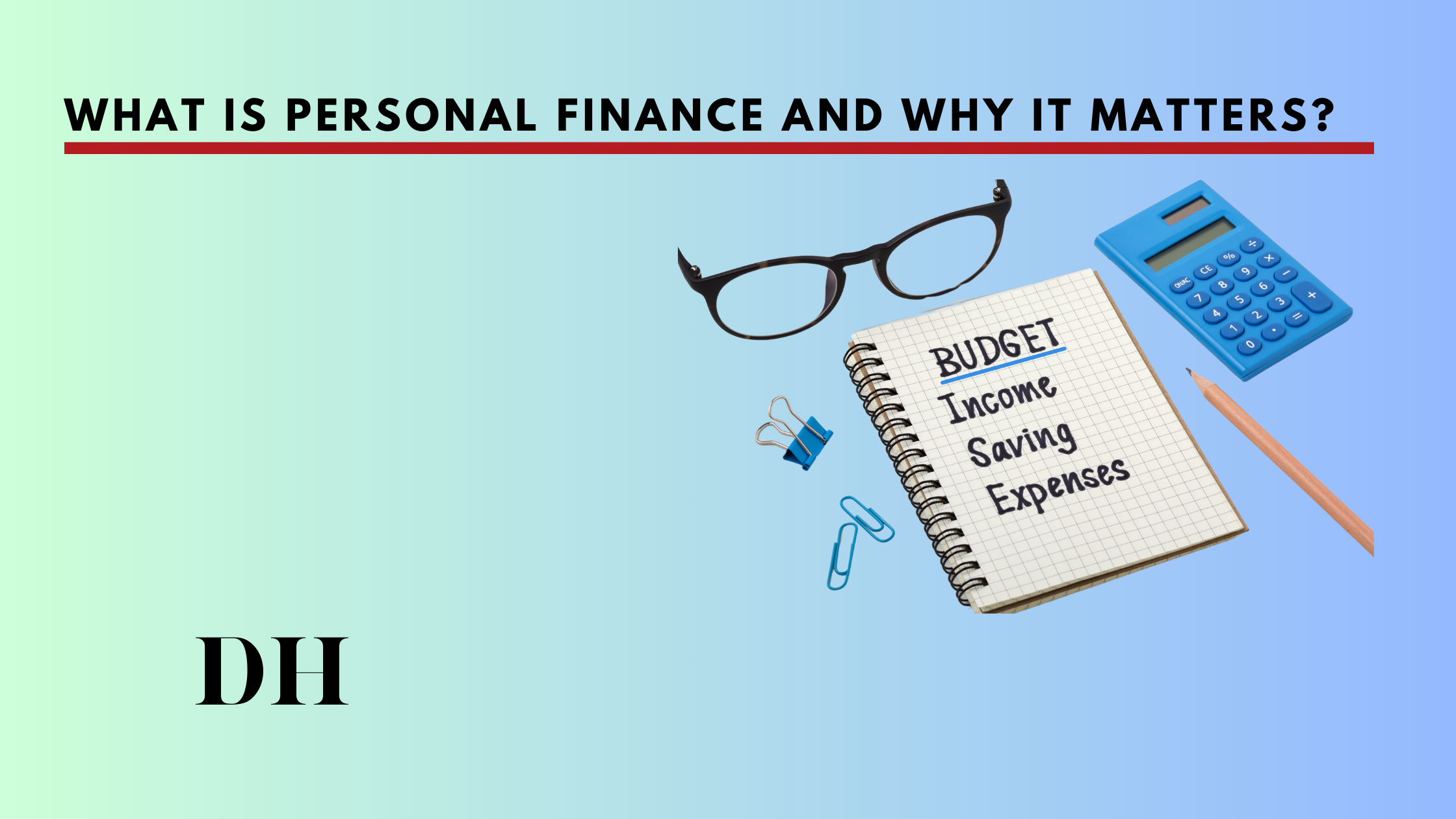
Have you ever wondered why personal finance is important? It’s a question that affects all of us, from young adults just starting out to retirees planning for their golden years. I’ve seen firsthand how understanding and managing our money can make a huge difference in our lives. Personal finance isn’t just about crunching numbers or pinching pennies – it’s about taking control of our financial future and building the life we want.
In this article, we’ll dive into the basics of personal finance and explore why it’s essential for everyone. I’ll share insights on budgeting, saving, investing, and long-term financial planning. We’ll also look at how personal finance education can boost your financial literacy and help you make smarter money decisions. Whether you’re looking to build wealth, manage debt, or get a better handle on your day-to-day expenses, understanding personal finance is key to achieving financial wellness and independence.

Understanding the Basics of Personal Finance
Personal finance is a broad term that covers all aspects of managing your money. It’s about making smart decisions with your income, expenses, savings, and investments to achieve your financial goals. I’ve found that understanding personal finance is crucial for everyone, regardless of their income level or financial situation.
Definition and Scope
Personal finance encompasses everything from budgeting and saving to investing and planning for the future. It’s about taking control of your financial life and making informed decisions that align with your goals and values. This includes managing your income, expenses, investments, and savings to achieve financial stability and security.
The scope of personal finance is quite extensive. It covers:
- Budgeting and saving
- Investing
- Debt management
- Retirement planning
- Insurance
- Taxes
- Estate planning
Each of these areas plays a crucial role in your overall financial health. For example, budgeting helps you track your spending and find ways to save, while investing allows you to grow your wealth over time.
Key Financial Concepts
To get a handle on your personal finances, it’s important to understand some key concepts:
- Income: This is the money you earn from your job, investments, or other sources. It’s the foundation of your financial planning.
- Spending: How you use your income to cover your needs and wants. Smart spending ensures you’re living within your means.
- Saving: Setting aside money for future needs or goals. This could be for emergencies, big purchases, or long-term objectives.
- Investing: Putting your money into assets like stocks, bonds, or real estate to grow your wealth over time.
- Debt Management: Strategies to minimize or eliminate debt, such as credit cards or loans.
- Financial Planning: Creating a roadmap to achieve your short-term and long-term financial goals.
One interesting statistic I came across shows the importance of financial planning. A 2022 survey found that about 48% of Canadians had a financial plan
Personal Finance vs. Corporate Finance
While personal finance focuses on individual financial matters, corporate finance deals with managing the financial resources of businesses. Here are some key differences:
- Scope: Personal finance revolves around individual or household finances, while corporate finance deals with the finances of entire organizations.
- Decision-making: In personal finance, decisions are made at an individual or family level. Corporate finance involves complex decision-making considering multiple stakeholders.
- Risk: Personal finance typically involves lower financial risks compared to corporate finance, which deals with larger sums and more complex financial instruments.
- Goals: Personal finance aims for individual financial security and achieving personal goals. Corporate finance focuses on maximizing shareholder value and ensuring the company’s financial health.
Understanding these differences can help you appreciate the unique challenges and strategies involved in managing your personal finances.
The Importance of Personal Finance in Daily Life
Personal finance isn’t just about numbers on a spreadsheet; it’s about shaping the life you want to live. I’ve seen how understanding and managing money can transform daily experiences and long-term prospects. Let’s explore why personal finance is crucial for everyone, regardless of income or background.
Financial Independence
Financial independence is a goal many of us aspire to achieve. It means having enough savings, investments, and cash on hand to afford the lifestyle we want for ourselves and our families. This isn’t just about being wealthy; it’s about having the freedom to make choices without being constrained by financial worries.
To work towards financial independence, I’ve found that it’s essential to:
- Live below your means
- Save consistently
- Invest wisely
- Plan for the long-term
One key strategy is to automatically save a portion of your income each month. Experts suggest setting aside about 20% of your income , with 10-15% going towards retirement savings. The remaining 5-10% can be used to build an emergency fund, which should cover three to six months of basic living expenses
Better Quality of Life
Good financial habits can significantly improve your day-to-day life. When you’re in control of your finances, you’re better equipped to handle unexpected expenses and pursue your goals. Here’s how personal finance can enhance your quality of life:
- Reduced stress: Financial worries can take a toll on your mental and physical health. By managing your money effectively, you can alleviate this stress and focus on enjoying life.
- Improved relationships: Money is often a source of tension in relationships. When you have a solid financial plan, you’re less likely to argue about money with your partner or family members.
- Better health: Financial stress can lead to physical symptoms like headaches and sleep problems. By managing your finances, you’re indirectly investing in your health.
- More opportunities: With a strong financial foundation, you’re better positioned to take advantage of opportunities that come your way, whether it’s furthering your education, starting a business, or pursuing a passion project.
Peace of Mind
One of the most significant benefits of good personal finance management is the peace of mind it brings. Knowing that you’re prepared for the future can alleviate a lot of anxiety and allow you to focus on enjoying the present.
Here are some ways personal finance contributes to peace of mind:
- Emergency preparedness: Having an emergency fund means you’re ready for unexpected expenses or income disruptions.
- Long-term security: Proper retirement planning ensures you can maintain your lifestyle even after you stop working.
- Risk management: Understanding and utilizing various insurance products can protect you from financial catastrophes.
- Informed decision-making: Financial literacy empowers you to make smart choices about your money, reducing the likelihood of costly mistakes.
To achieve this peace of mind, it’s crucial to educate yourself about personal finance. This doesn’t mean you need to become a financial expert overnight. Start by learning the basics of budgeting, saving, and investing. There are many resources available, including online courses, books on personal finance, and financial apps and tools.
Remember, personal finance is a journey, not a destination. It’s about making consistent, informed decisions that align with your goals and values. By prioritizing your financial education and applying what you learn, you’re taking control of your financial future and paving the way for a more secure, fulfilling life.
Core Areas of Personal Finance
Personal finance is a broad field that encompasses several key areas. I’ve found that understanding these core components is crucial for achieving financial stability and reaching our long-term goals. Let’s dive into the main pillars of personal finance that we all need to master.
Budgeting and Expense Tracking
Budgeting is the foundation of sound financial management. It’s about creating a plan for every dollar we earn. I’ve learned that a budget isn’t just about restricting spending; it’s a tool that gives us more financial freedom and reduces stress.
To create an effective budget, we need to:
- Calculate our after-tax income
- Track all our expenses
- Categorize our spending into needs and wants
- Set realistic financial goals
One popular budgeting system is the 50/30/20 rule: This guideline suggests allocating 50% of our income to needs, 30% to wants, and 20% to savings and debt repayment. I’ve found this approach helpful in balancing necessary expenses with personal enjoyment and future planning.
Savings and Investments
Saving is crucial for building financial security. It provides a safety net for unexpected events and helps us achieve short-term goals. But to truly grow our wealth over time, we need to invest.
Here’s how I prioritize savings and investments:
- Build an emergency fund (aim for 3-6 months of living expenses)
- Capture employer match in retirement accounts (like 401(k)s)
- Pay off high-interest debt
- Max out retirement contributions
- Invest in a diversified portfolio
Starting early with investing is key. Thanks to compound interest, even small regular investments can grow significantly over time. For example, [every $1,000 we don’t invest in our 20s could mean $20,000 less at retirement].
Debt Management
Managing debt is a critical aspect of personal finance. While some debt can be beneficial (like a mortgage or student loans for higher education), high-interest debt can be a major obstacle to financial freedom.
Here’s a strategy I use for tackling debt:
- List all debts with their interest rates
- Focus on paying off high-interest debt first (like credit cards)
- Consider debt consolidation for lower interest rates
- Avoid taking on new, unnecessary debt
It’s important to note that [if our total unsecured debt equals half or more of our gross income, it’s time to take serious action]. In such cases, we might need to consider drastic spending cuts or seek professional financial advice.
Insurance and Risk Management
Insurance is a crucial part of personal finance that often gets overlooked. It’s about protecting ourselves and our loved ones from potential financial catastrophes.
Key types of insurance to consider include:
- Health insurance
- Life insurance
- Disability insurance
- Property insurance
- Liability insurance
Risk management goes beyond just insurance. It’s about identifying, assessing, and controlling potential threats to our financial well-being. For instance, [about 70% of Americans who reach age 65 will need some form of long-term care]. Planning for such eventualities is an essential part of comprehensive financial planning.
By focusing on these core areas of personal finance – budgeting, saving and investing, debt management, and risk management – we can build a solid foundation for our financial future. Remember, personal finance is a journey, not a destination. It requires ongoing attention and adjustment as our life circumstances change. But with consistent effort and smart decision-making, we can achieve our financial goals and secure our financial well-being.
Personal Finance Education: Why It Matters
I’ve come to realize that personal finance education is not just a nice-to-have skill; it’s a crucial life tool that can shape our financial future. Let’s dive into why it’s so important and how it impacts our lives.
Financial Literacy Statistics
The numbers paint a sobering picture of financial literacy in the United States. Did you know that only 57% of adults in the U.S. are considered financially literate This statistic alone highlights the urgent need for better financial education.
What’s even more concerning is the state of financial literacy among young people. A yearly test by the National Financial Educators Council (NFEC) revealed that 52% of those aged 15-18 didn’t achieve a passing score of 70 or more on their National Financial Literacy Test. This gap in knowledge can have far-reaching consequences as these young adults enter the workforce and start making important financial decisions.
But there’s hope on the horizon. A 2023 survey showed that 74% of Americans said they have a budget and follow it to keep track of spending. This is a positive step, as maintaining a budget is a fundamental aspect of financial literacy. However, the same survey revealed that 16% still spend more than their monthly budget, indicating there’s room for improvement.
Impact on Decision-Making
Financial literacy isn’t just about knowing facts and figures; it’s about making informed decisions that can significantly impact our lives. When we’re financially literate, we’re better equipped to weigh options and make choices that align with our financial goals.
For instance, people with higher financial literacy are more likely to live within their means, have three months’ worth of income in an emergency fund, and have at least one kind of retirement account. These are all crucial elements of a solid financial foundation.
On the flip side, financial illiteracy can lead to poor spending decisions and a lack of long-term preparation. This can result in unsustainable debt burdens, poor credit, and even bankruptcy or foreclosure. It’s a stark reminder of why financial education matters.
Long-term Financial Well-being
Financial literacy isn’t just about managing day-to-day expenses; it’s about setting ourselves up for long-term financial well-being. When we understand financial concepts and processes, we’re better positioned to use credit wisely, manage debt, and make informed investment decisions.
One area where this is particularly crucial is retirement planning. With the changing landscape of pension schemes and social protection, we’re increasingly responsible for our own financial futures. Financial literacy helps us understand the importance of saving for retirement early and consistently.
For example, did you know that over three-quarters of Baby Boomers and the Silent Generation know of 401(k)s but don’t use them? This highlights a significant missed opportunity for long-term financial security.
Moreover, financial literacy gives us the confidence to navigate complex financial products and make decisions that support our long-term goals. It’s about developing the skills to budget, save, and invest effectively, setting us up for a more secure financial future.
In essence, personal finance education is about empowering ourselves to take control of our financial lives. It’s not just about understanding numbers; it’s about making informed choices that can lead to financial stability and peace of mind.
As we continue to face complex financial decisions in an ever-changing economic landscape, the importance of financial literacy only grows. It’s a skill that pays dividends throughout our lives, helping us navigate financial challenges and seize opportunities for a brighter financial future.
Tools and Resources for Managing Personal Finances
In today’s digital age, we’re fortunate to have a wealth of tools and resources at our fingertips to help us manage our personal finances. I’ve found that leveraging these resources can make a significant difference in how we handle our money. Let’s explore some of the most effective tools available.
Budgeting Apps
Budgeting apps have revolutionized the way we track our spending and stick to financial plans. I’ve discovered that using mobile programs for budgeting can help us visualize our expenses and start asking ourselves valuable questions about how we’re spending our money. These apps often sync with our bank and credit card accounts, providing a holistic view of our finances.
One popular app I’ve come across is Monarch. It features more automation and fewer notifications than other apps, making it appealing to those who don’t want to be hands-on with every transaction. Monarch uses zero-based budgeting, allowing us to plan for every dollar we make.
Another app worth mentioning is YNAB (You Need A Budget). It’s a no-frills app that employs the zero-based budget system. With YNAB, we map out our expenses in detail, creating spending buckets and funding them each time we get paid.
For couples managing finances together, Honeydue is an excellent option. It allows us to link various cards and accounts and then specify whether each belongs to us, our partner, or both. This kind of visibility can help couples stay accountable.
Financial Planning Software
While mobile apps are great for day-to-day budgeting, financial planning software offers more robust money management experiences. These programs often provide expanded capabilities beyond budgeting, like tax software integration and payment management.
One popular option is Empower (formerly Personal Capital). The free version includes features necessary for basic financial planning, such as the ability to link all financial accounts in one place, a net worth tracker, and tools for forecasting retirement and college savings outcomes.
Quicken is another comprehensive solution, offering multiple packages depending on our specific needs. The Deluxe package, for instance, allows us to formulate custom budgets, create and manage specific savings goals, and track our debt.
For those of us looking for more advanced features, WealthTrace offers three package tiers: Basic, Advanced, and Deluxe. It provides tools for budgeting, setting specific savings goals, planning for retirement and college savings, and gaining insights into minimizing tax liabilities.
Online Courses and Workshops
To truly master personal finance, continuous learning is key. I’ve found that online courses and workshops can be incredibly valuable in enhancing our financial literacy.
One course I’d recommend is “Finance for Everyone: Smart Tools for Decision-Making” by the University of Michigan on edX. Guided by Professor Gautam Kaul, this free-to-audit course is designed to enhance our financial literacy and decision-making skills.
For those looking to build a strong foundation in financial planning, “Introduction to Personal Financial Planning” offered by Indiana University through edX is an excellent choice. This free-to-audit course provides the foundational knowledge necessary to build a secure financial future.
If you prefer a more concise approach, “Modern Money Habits: 5 Steps to Build the Life You Want” on Skillshare might be perfect. In just 70 minutes, Justin Bridges shares a straightforward, five-step approach to financial mastery.
For our friends in the UK, OpenLearn offers an array of personal finance courses tailored to the UK market. These courses combine text-based tutorials with interactive quizzes and even offer a free certificate upon completion.
By leveraging these tools and resources, we can take control of our personal finances and work towards a more secure financial future. Remember, the best tool is the one we’ll actually use consistently. Hence, it’s worth exploring different options to find what works best for our individual needs and goals.
Conclusion
Personal finance is a critical skill that impacts every aspect of our lives. From budgeting and saving to investing and planning for the future, understanding how to manage our money effectively can lead to financial independence and peace of mind. By focusing on key areas like expense tracking, debt management, and risk assessment, we can build a solid foundation for our financial well-being.
In today’s digital age, we have access to a wealth of tools and resources to help us navigate our financial journey. Budgeting apps, financial planning software, and online courses offer practical ways to enhance our financial literacy and make informed decisions. By taking advantage of these resources and committing to ongoing financial education, we can work towards a more secure and prosperous future for ourselves and our loved ones.
FAQs
What is the significance of finance for all individuals?
Finance is crucial because it enables people to purchase homes since not everyone can afford to pay in cash. It also allows companies to grow and expand, facilitating a more effective allocation of capital resources.
Why is having a personal financial statement crucial?
Personal financial statements are essential as they help monitor your spending and aim to increase your net worth. They provide a comprehensive overview by linking your net cash flow from your cash flow statement to efforts to boost your net worth.
What does personal finance entail, and why is it important?
Personal finance involves managing all financial decisions and activities for an individual or household, including budgeting, insurance, mortgage planning, savings, and retirement planning. A good grasp of personal finance helps individuals control their finances more effectively and prepare for future financial stability.
Why should everyone engage in personal financial planning?
Personal financial planning is beneficial as it helps individuals set measurable financial goals and understand the impact of their financial decisions. It provides a structured approach to budgeting, which can significantly enhance one’s control over their financial lifestyle.






